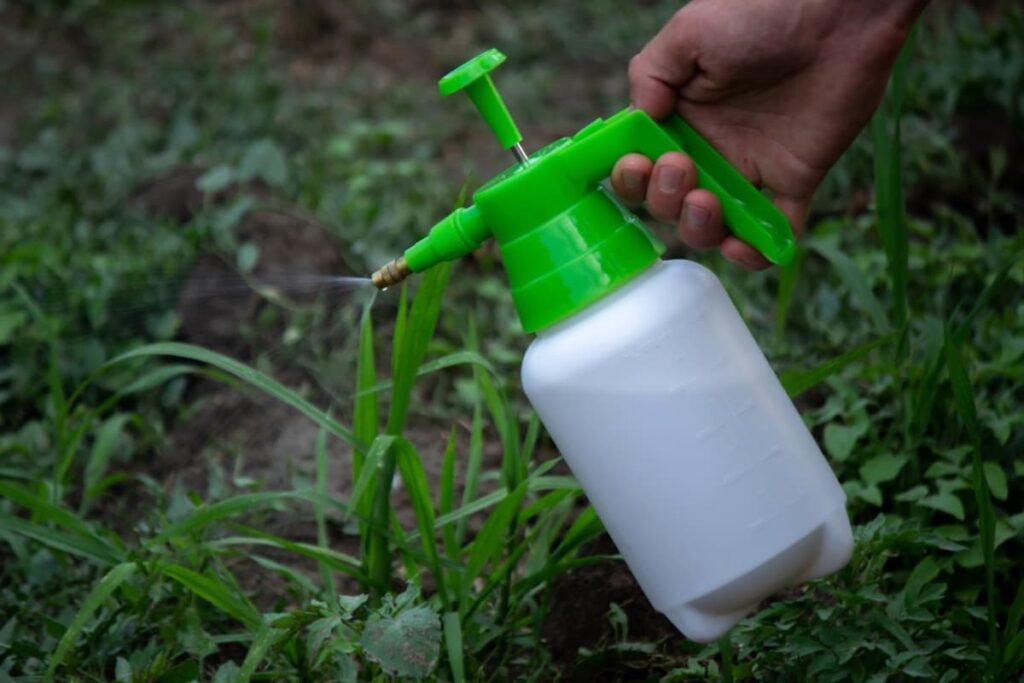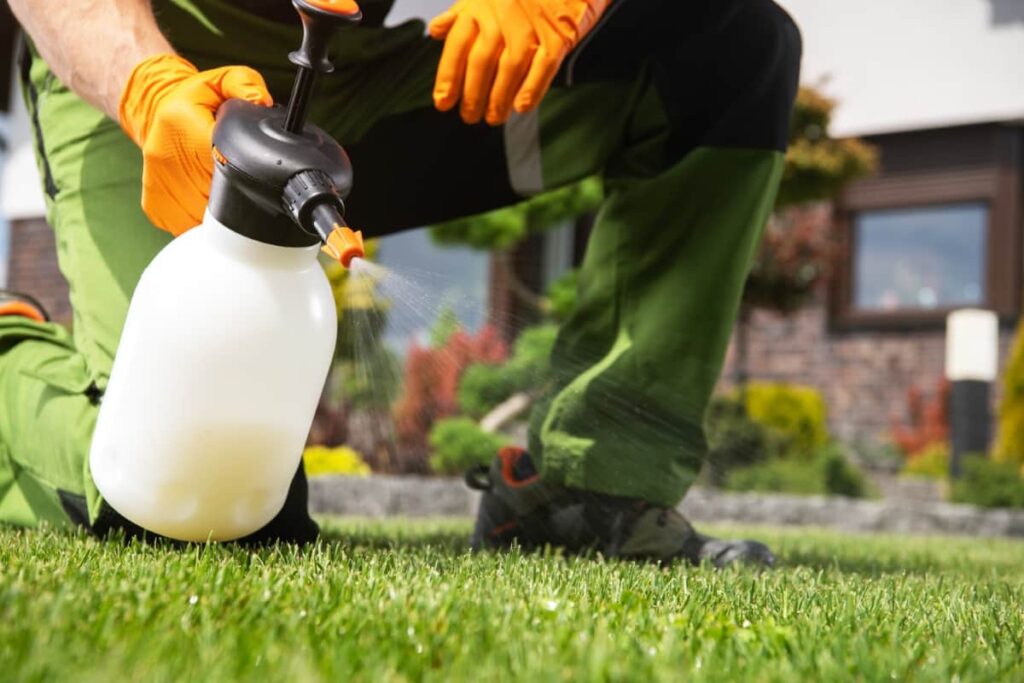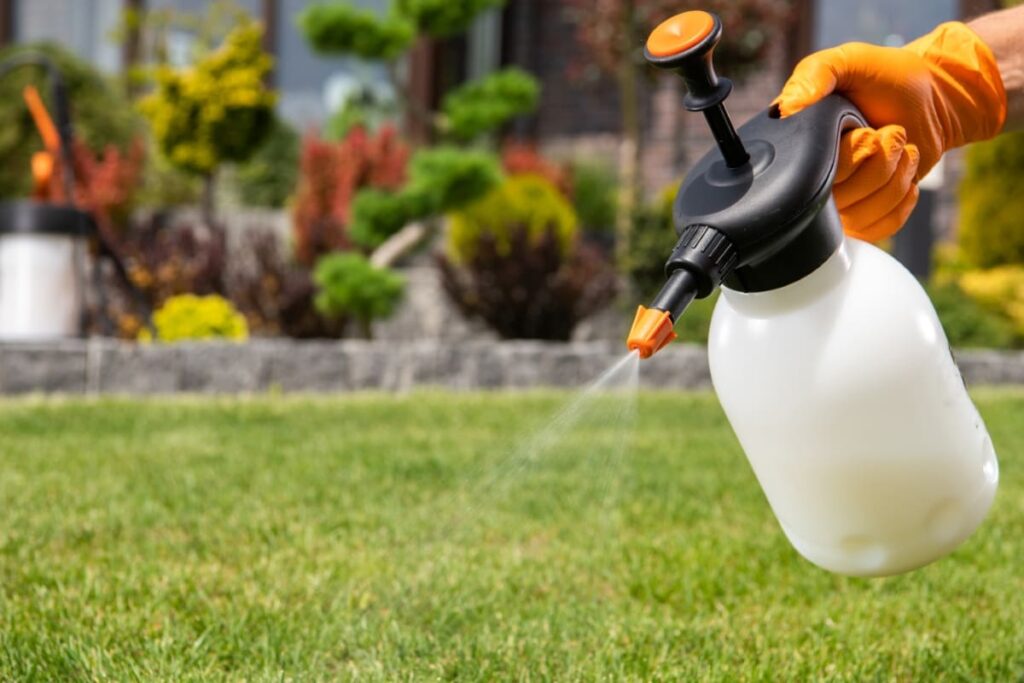Weed management is a critical aspect of maintaining healthy gardens and agricultural landscapes. While synthetic pesticides have been commonly used, concerns over their environmental impact and potential risks to health have led to a growing interest in natural alternatives. In this comprehensive guide, we

explore ten effective natural pesticides for weed plants. These natural garden solutions not only offer an eco-friendly approach to weed control but also provide viable options for sustainable agriculture and gardening practices.
10 Best Natural Pesticides for Weed Plants
Vinegar-Based Herbicide
Vinegar is a general household ingredient that can be used as a natural weed killer. The vinegar acts as a desiccant, causing the weeds to dry out and die. To make a vinegar weed killer, simply mix white vinegar with water in equal parts and add a small amount of dish soap to help the solution adhere to the leaves of the weeds.
You can mix salt into the mixture to increase its effectiveness. To use vinegar-based herbicide, simply spray the solution directly onto the leaves of the weeds on a sunny day. Don’t spray any desirable plants, as vinegar can also damage them.
Salt Solution
Salt is another household ingredient that can be used to control weeds effectively. Salt solution for weeds works by dehydrating the weeds and inhibiting their ability to absorb water and nutrients from the soil. To make this organic herbicide, dissolve one part salt in three parts water and add a small amount of dish soap to help the solution stick to the weeds.
Like vinegar-based herbicide, salt solution should be sprayed directly onto the leaves of the weeds on a sunny day. Be careful not to overspray, as salt can also harm desirable plants and make the soil uninhabitable for future plant growth.
Corn Gluten Meal
It is a natural byproduct of the corn milling process that has been found to have pre-emergent herbicidal properties. When applied to the soil, it inhibits the germination of weed seeds, preventing them from sprouting and establishing themselves in the garden. To use this eco-friendly weed control as a natural herbicide, simply spread a thin layer of the meal over the soil in your garden beds.
Be sure to water the area thoroughly after application to activate the herbicidal properties of the corn gluten meal. It’s best to apply corn gluten meal in the spring before weed seeds have had a chance to germinate.
Boiling Water Technique
Boiling water is a simple yet effective natural herbicide that can be used as organic weed management to kill weeds in areas where you don’t want any vegetation to grow, such as cracks in sidewalks or driveways. Simply boil a pot of water and pour it over the weeds, making sure to saturate the roots as much as possible.
In case you missed it: 10 Best Natural Pesticides for Vegetable Garden: 100% Effective to Kill Bugs on Vegetable Plants

Boiling water works by destroying the cell structure of the weeds, wither and die. This DIY weed control method is most effective on young, tender weeds with shallow roots. Take precautions when handling boiling water to avoid burns, and avoid pouring it near desirable plants, as it can also damage them.
Essential Oils Blend
Essential oils, such as clove, peppermint, and citrus oils, contain natural compounds that have herbicidal properties. To make this homemade weed pesticide, mix several drops of clove, peppermint, and citrus oils with water and a few drops of dish soap liquid in a spray bottle. Shake well to combine the ingredients, then spray it directly onto the weeds.
Essential oil herbicide works by disrupting the cell membranes of the weeds, causing them to wilt and die. This method is best used on sunny days when the oils can penetrate the leaves more effectively. Be sure to avoid spraying essential oils near desirable plants, as they can also be harmful to them.
Soap-Based Herbicide
Soap-based herbicides are an effective and non-toxic weed eradication in your garden. These herbicides work by disrupting the cell membranes of plant leaves, causing them to dry and die. Soap-based herbicides are typically made from potassium salts of fatty acids, which are extracted from natural sources like plant oils. To use this safe weed prevention herbicide, simply mix the concentrate with water as per the label instructions and spray it directly onto the leaves of the weeds. Be sure to coat the leaves for maximum effectiveness thoroughly.
Neem Oil
Neem oil has been used for centuries in agriculture due to its insecticidal and fungicidal properties. As an environmentally safe herbicide, neem oil works by disrupting the insect’s hormonal balance, making it difficult for them to feed, grow, and reproduce. To use this pet-safe weed killer, mix it with water as per the label instructions and spray it onto the weeds. It is effective against a wide range of weed species, including broadleaf and grassy weeds. It can also help suppress the growth of fungal diseases that may affect your plants.
Citrus Oil Extract
Citrus oil extract, also known as d-limonene, is derived from the citrus fruits like lemons, oranges, and limes. It is a powerful natural solvent that can effectively kill weeds by breaking down their cell walls and dehydrating them. To use citrus oil extract as a weed pesticide, mix it with water as per the label instructions and spray it onto the leaves of the weeds. Citrus oil extract works best on small, young weeds, so it may need to be reapplied as new weeds emerge.
Mulching
Mulching is a chemical-free weed suppressant that involves covering the soil around the plant’s base with organic material, like straw, wood chips, or leaves. It acts as a barrier, preventing weed seed germination. For this organic gardening weed control, spread a mulch layer around your plants, being careful to avoid covering the stems or crowns. Mulch should be applied to a thickness of 2-4 inches for optimal weed suppression. Replenish the mulch as required to maintain its effectiveness.
In case you missed it: 10 Best Natural Pesticides for Indoor Plants: 100% Effective to Kill Bugs on Houseplants

Flame Weeding
Flame weeding involves passing a propane torch over the weeds, wilt and die from the heat. Flame weeding is particularly effective against annual weeds with succulent foliage, although it may not be as effective against perennial weeds with deep roots. To flame weed effectively, use a handheld propane torch or a specialized flame weeder attachment for your garden hose.
Pass the flame over the weeds in a slow, sweeping motion, being careful not to ignite nearby plants or structures. Flame weeding works best when weeds are small and actively growing, so it may need to be repeated periodically throughout the growing season.
In case you missed it: 10 Best Natural Pesticides for Hibiscus Plants: 100% Effective to Kill Hibiscus Bugs

Conclusion
In conclusion, these ten natural and sustainable weed control methods provide eco-friendly solutions that are safe for humans, animals, and the surrounding environment. Incorporating natural weed control methods into gardening and farming practices can promote sustainability and minimize environmental impact. By embracing these natural alternatives, individuals can cultivate healthy landscapes while reducing reliance on conventional chemical pesticides.
- Aquaponic Farming at Home: A Step-By-Step Guide
- Profitable Village Farming Business Ideas in 2024
- High-Yield Aquaculture: Fast-Growing Fish for Farming
- Effective Fish Pond Construction Techniques for Beginners
- Irrigation and Water Management in Pineapple Farming
- Blossom to Harvest: Mastering Flowering and Pollination in Papaya Farming
- Pig Fattening Essentials: From Selection to Sale for Beginners
- Raising Wagyu Cattle: A Complete Guide for Premium Beef Production
- Soil Types and Their Water Holding Capacity
